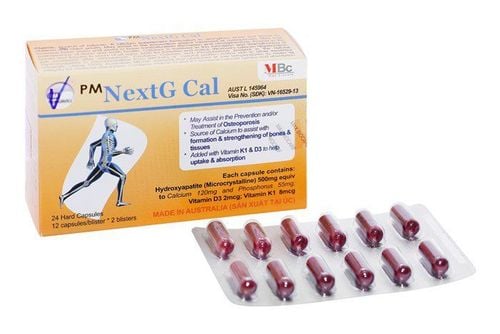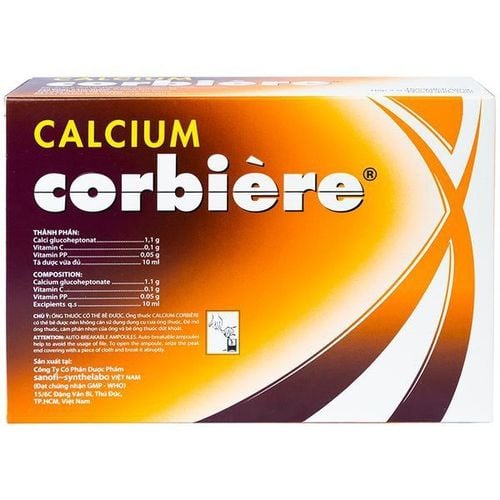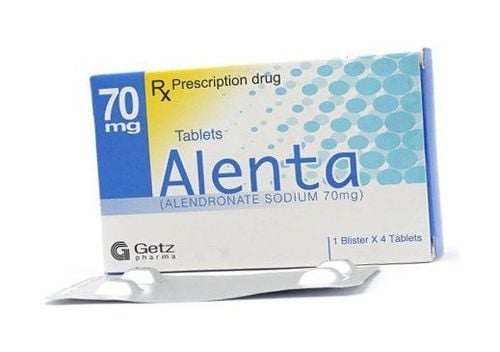This is an automatically translated article.
Alenbe is made in the form of tablets, with the main ingredient being alendronic acid. It is used to treat osteoporosis in postmenopausal women.
1. Uses of the drug Alenbe
Alenbe medicine has the main ingredient is Alendronic acid with a content of 70mg (so it is also known as Alenbe 70mg drug). Alendronate is an amino bisphosphonate that inhibits bone resorption and does not affect bone formation. Studies have shown that alendronate selectively accumulates at active sites of bone resorption to inhibit the activity of osteoclasts. Clinical studies have shown that treatment with alendronate can increase bone mass in the spine, trochanter, and femoral neck.
Alenbe 70mg is indicated for: Treatment of osteoporosis in postmenopausal women.
Alenbe is contraindicated for use in the following cases:
People with esophageal malformations that slow emptying, narrow esophagus or do not dilate the cardia of the esophagus; Person's inability to stand or sit upright for at least 30 minutes; Patients with hypersensitivity to bisphosphonates or other components of the drug; People with hypocalcemia.
2. How to use and dose Alenbe
2.1. How to take Alenbe is taken orally. For good absorption, Alenbe should be taken with about 180-240ml of water (do not use mineral water, coffee or juice) at least 30 minutes before meals, the first drink of the day or before taking medicines other. The patient should swallow the tablet straight, without sucking or chewing it. After taking Alenbe, the patient should avoid lying down for at least 30 minutes to allow the medicine to enter the stomach easily and reduce the risk of esophageal irritation.
2.2. Dosage Take 1 tablet / time / week (equivalent to 70mg alendronic acid / time / week).
The optimal duration of treatment for osteoporosis with Alenbe has not been established. The need for continued medication should be based on regular evaluation by the physician, especially when the duration of treatment is longer than 5 years.
2.3. Overdose When overdosed with alendronate, patients may experience hypocalcemia, hypophosphataemia, and other upper gastrointestinal reactions (gastrointestinal disturbances in the stomach, heartburn, esophagitis, peptic ulcers). ). In case of overdose, the patient should notify the doctor and go to the nearest hospital for timely treatment.
2.4. Missed dose When forgetting to take a dose of Alenbe, patients should take it as soon as they remember. If it is almost time for the next dose, the patient can skip the missed dose and take the next recommended dose at the next recommended time.
3. Side effects of the drug Alenbe
When using Alenbe, patients may experience some unwanted side effects:
Common: Headache, acid reflux, flatulence, difficulty swallowing, esophageal ulcers, abdominal distension; Uncommon: Erythema, gastritis. In general, side effects from taking Alenbe are usually mild and do not require discontinuation of the drug. However, patients should still notify the doctor for advice and receive appropriate advice.
4. Be careful when using Alenbe
Some notes users need to remember when taking Alenbe:
There have been cases of esophageal events such as esophagitis, esophageal ulceration, sometimes with bleeding in patients treated with alendronate (component) main drug Alenbe); Stop using Alenbe and see your doctor if you experience difficulty swallowing, painful swallowing or pain behind the breastbone. The risk of serious esophageal events is greater in patients who lie down immediately after taking the drug or do not take the drug with the recommended amount of water or continue to take the drug after symptoms of the condition appear. esophageal irritation; Alendronate can irritate the lining of the upper gastrointestinal tract, so caution should be taken when using Alenbe in patients with existing upper gastrointestinal diseases such as dysphagia, gastritis, esophageal disease, duodenal ulcer. ; Hypocalcaemia should be treated before starting Alenbe. In addition, other disorders of inorganic metabolism should be effectively treated, such as vitamin D deficiency; Supplement with calcium and vitamin D if dietary intake is insufficient; Alenbe should not be used by pregnant women; Use caution when using Alenbe in women who are breast-feeding (must be prescribed by a doctor).
5. Alenbe drug interactions
Some drug interactions of Alenbe include:
Estrogen: The safety and effectiveness of the concomitant use of hormone replacement therapy and alendronate in postmenopausal women have not been established. Therefore, it is not recommended to use the two drugs at the same time; Calcium supplements and antacids: May decrease absorption of alendronate. Therefore, patients should wait at least 30 minutes after taking alendronate before taking another drug; Acetylsalicylic acid: In some clinical studies, the risk of upper gastrointestinal adverse events was increased in patients receiving concomitant doses of alendronate greater than 10 mg/day and compounds containing acetylsalicylic acid; Nonsteroidal anti-inflammatory drugs (NSAIDs): Alendronate may be used in patients taking NSAIDs. However, NSAIDs often cause gastrointestinal irritation and should be used with caution when combined with alendronate. During the use of Alenbe, patients need to strictly follow the doctor's instructions on dosage and how to use the drug. If undesirable side effects occur, the patient should notify the doctor immediately.
Please dial HOTLINE for more information or register for an appointment HERE. Download MyVinmec app to make appointments faster and to manage your bookings easily.













